Table of Contents
ToggleThe incidence of hereditary breast cancer ranges from 5%–10%. Through genomic testing advances, other high penetrance susceptibility genes have also been identified, though mutations in BRCA1 and BRCA2 have been linked to the majority of familial cases. The likelihood of some kinds of breast cancer running in families is undeniable. You are not destined to develop breast cancer simply because one of your relatives did. In addition, if you are at risk of breast cancer, it is important to undergo frequent monitoring and screening in order to catch and treat it early.
Causes of Hereditary Breast Cancer
An inherited mutation in the BRCA1 or BRCA2 gene is the most common cause of hereditary breast cancer. DNA repair proteins are made by these genes in normal cells. The mutation of these genes can result in abnormal cell growth, thereby leading to cancer.
- Breast cancer is more likely to occur in people who inherit mutated copies of either gene.
- The risk of getting breast cancer by the age of 80 is 7 in 10 for women with BRCA1 or BRCA2 gene mutations. Additionally, the risk of breast cancer is affected by the number of family members who have been diagnosed with it.
- These mutations are associated with a higher risk of breast cancer at an earlier age and cancer in both breasts in women with these mutations.
- Some cancers such as ovarian and cervical cancer are also more common in women with one of these gene changes.
Who is at the Risk for Hereditary Breast Cancer ?
If you have a close relative who developed breast cancer at a young age or if they are very close relatives, such as your mother, sister or daughter, it is possible that your risk will increase.
It may be a good idea to consider genetic testing if your family has a history of early onset breast cancer. It is possible to find out what course of action would be most effective for you at a comprehensive breast center staffed by experienced breast specialists.
Is There Any Genetic Test for Breast Cancer?
The BRCA mutation has been linked to breast cancer, so you might want to get tested if you think you have a genetic risk for the disease. In most cases, insurance companies cover the cost of the genetic test. Results can take up to a couple of weeks. Labs can look for specific mutations for those with family members with abnormal breast cancer genes. You may need to wait one week for the results in these cases.
Who Should Test for the Genetic Breast Cancer Risk?
Genetic counseling should be sought by anyone who suspects they may carry a cancer-causing gene. In deciding whether to undergo the testing, you must make a big decision.
The results of your test may have a significant impact on your well-being, your career, your family and other aspects of your life. You and your family, including your siblings and children, may be affected by the results. Genetic mutations, for instance, have about a 50% chance of passing on to future generations.
A gene test may be recommended by your doctor if:
- An individual in your family has been found to carry a mutated gene
- A breast cancer diagnosis was made before the age of 50
- Breast cancer has been detected in a male member of your family
- Ovarian cancer has been diagnosed in you
- Several members of your family have been diagnosed with breast cancer
- You or someone in your family has been diagnosed with both breast cancers.
What Happens if the Test Comes Positive for Genetic Breast Cancer?
In the event that your care provider confirms that you are at risk, you can work with him or her to develop a plan to protect your health, including:
- Evaluation and monitoring of high-risk situations
- Mammography and clinical breast exams as part of screening schedules
- A hormone therapy medication that prevents breast cancer from developing
Patients at very high risk for aggressive breast cancer should only undergo preventive (prophylactic) surgery, such as mastectomy with breast reconstruction.

MS (NMC Regd.2902)
Head of the Department, Sr.Consultant Surgical Oncologist at Nepal Cancer Hospital and Research Center
Director: Breast Cancer Program
Interest: Breast Cancer Surgery, Gastro Intestinal Cancer Surgery (Stomach and Colo-Rectal Cancer)


